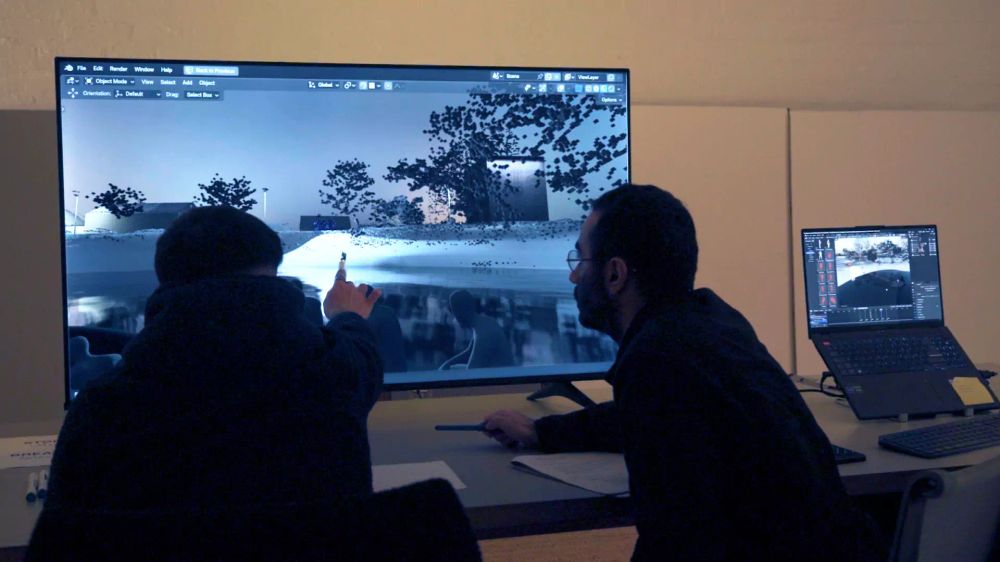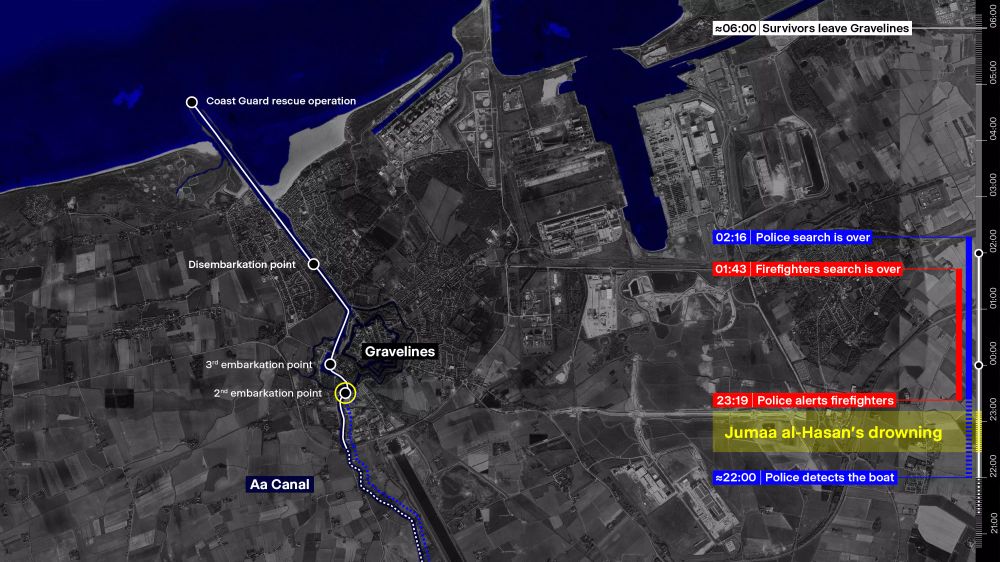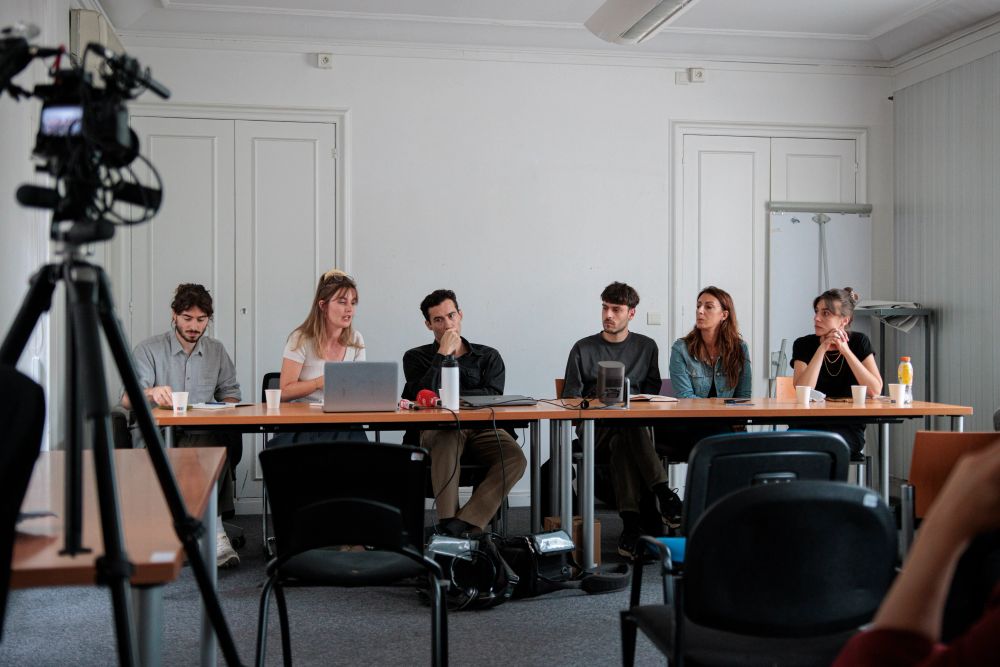The Death of Jumaa al-Hasan
The Channel
On the evening of the 2nd of March 2024, an inflatable boat set out on the Aa River, its passengers hoping to reach the UK by crossing the Channel. Along the Canal, groups of people were trying to embark, among them was 27-year-old Jumaa al-Hasan. As tensions flared along the canal caused by the police attempting to prevent the group from boarding the moving vessel, Jumaa al-Hasan was discovered hiding near the water’s edge. Trapped between the suffocating cloud of teargas and the muddy river, he made a desperate choice: he jumped into the canal. Within moments, he vanished beneath the surface. Directly after his disappearance friends and witnesses who were on the boat pleaded with the authorities to search for him, but their appeals were met with silence and indifference. Seven days after his disappearance, Jumaa al-Hasan’s uncle Mohamed al-Mohamed al-Hasan travelled to Calais hoping to find his nephew. He went to the police station to report the disappearance, trying to file a complaint and convince the authorities to continue the search, but the complaint was rejected and turned into a simple log entry. Nine days after the disappearance, his family, supported by activist groups made a public appeal1 for the case to be reopened and for the search to continue. On the morning of March 19, 2024, 16 days after Jumaa al-Hasan disappeared, his body was found in the Aa canal, just 500m away from where he had last been seen.
Endangering Embarkations
To escape increasing police patrols, tear gas attacks and interceptions on the beaches, migrants have been forced to take even greater risk.2 Nawras*, one of the witnesses we spoke to as part of our investigation described the increasingly dangerous situation on the French side of The Channel:
“In Calais, at any moment, you could get arrested. If you were in a group of two or three people, the police would come and take you away. So, those who wanted to reach the UK were willing to take any risk. A damaged boat, a broken engine, someone dead, someone alive – it didn’t matter, as long as they could get out and never see the police again.” - Nawras*
To avoid the dangerous security risk along the beaches people on the move on the French side of The Channel have turned to the rivers and canals. In certain areas of Hauts-de-France, the police have installed floating barriers to block boat passage, such as on the Canche River3 and the Authie River.4 The police have also adapted their operations by following the boats as soon as they are spotted.
“They didn’t care about the people here – their only concern was the boat. They wanted to go after the boat. When we turned back, the police turned back with us.” - Nasser*
However, under current guidelines, French police are only permitted to intervene offshore in cases where passengers are in distress. In effect, this policy allows officers to halt boats before departure but limits their actions once the boats are at sea or in the canal. These policies and the police presence along the riverbanks create a hostile environment – where police try to prevent anyone from embarking by force, turning the moment of boarding a dinghy into a life-threatening attempt to escape.
This intentional endangerment of human life is evident in Jumaa al-Hasan’s case, where a group of policemen approached him from behind, trapping him between the tear gas and the river. The French government now plans to expand these policies further and to enable officers to intervene in the water up to 300 metres from the coast, which would also include their intervention along rivers and inland waterways.5 This will likely increase the tensions and danger that people experience when trying to cross The Channel.
Indifference

Mounir* one of the survivors we spoke to recounts his experience of the night during the Situated Testimonies, 2025.
After a thorough investigation LIMINAL, INDEX and the journalists collective Hors-Cadre were able to locate four survivors who agreed to testify in detail about the events that led to Jumaa al-Hasan's disappearance, revealing a different side of the story. Their testimonies, cross-referenced with additional data and official documents, allowed us to reconstruct the incident in a 3D digital model. This model served as a spatial framework to document and synchronize the survivors’ testimonies, enabling us to reconstruct the sequence of events leading to Jumaa al-Hasan’s disappearance. These testimonies not only shed light on the circumstances of his death but also expose the broader desperation of those attempting to leave France, a country where migrants often find themselves trapped in a state of limbo, waiting for an opportunity to escape. Nawras* and Nasser* reflected:
“Just hearing the word "France" makes my mind automatically associate it with cold, fear, hunger, humiliation, and – to be honest – death.” - Nawras*
“We set off at a time when we were desperate to leave. I mean, whichever route you take, you're taking a risk – you could die, you could get caught, anything could happen to you. You don’t want to take risks, but at that time, with all the hardship we went through in France, I just wanted to get out.” - Nasser*
During the Situated Testimonies several of the witnesses we spoke to recall the indifference that they were met with by the police:
“What I experienced from the police – their response – was total indifference. Not in the sense of aggression. They didn’t act violently toward me or anything like that. But they treated me as if I was just asking for permission to visit a friend, not to save him.” - Nawras*
Official sources have stated that the police called the fire brigade at 11.19pm. By that time, people were stuck in the mud next to the Vauban lock. The firefighters helped to recover people from the mud and later searched the area with a drone – two of the witness remember the sounds of it. The firefighter’s report indicates the time of the drone deployment to be between 23:29 and 01:29. The Search for a Missing person that night took 2h and 8 minutes and concluded with “no one in the water”. The report also mentioned several groups that are visible on the docks. Survivors who were on the boat and disembarked later tried their best to look for Jumaa al-Hasan that night.
“At first, the police told us that the person who went into the water had come out. We didn’t respond to them. We went to the others who had gone into the river with us and started searching together. We searched for about half an hour, covering the entire area with flashlights. Since it was nighttime and dark, we searched everywhere, but we couldn’t find a trace of him.” - Bilal*
At 2.16am, the policemen told Utopia's team over the phone that the search was over. While the police stayed on the ground around the Vauban Basin the search for Jumaa al-Hasan was quickly put to an end.
“By dawn, we searched again, but we still didn’t find anything. Nothing at all. The police were still there, and they told us again that the person who went in had come out. That’s what happened when Jumaa drowned.” - Bilal*

Map of Gravelines tracing the inflatable boat’s route on the Aa canal, the site of Jumaa al-Hasan’s disappearance, and the timeline of the search by French police and firefighters.
Demand for Truth and Justice

Press conference by INDEX, Hors Cadre and Utopia 56 at Les Arches Citoyennes, Paris, 8 July 2024. Photograph by Félix Vanderdonckt.
After Jumaa al-Hasan’s body was found, the Dunkirk prosecutor's office opened an investigation to ‘determine the causes of death.' But the official investigation of the court of Lille is focusing its investigations on the boat drivers and ‘smuggling networks’, disregarding any possible involvement of police forces in the incident. Knowing that their actions are easy to justify and met with impunity, the police are free to continuously use aggressive methods to restrain people from crossing. Mr al-Hasan’s case is one of at least 366 people, who have died while trying to cross the Channel since 2011 – a number that has risen sharply over the past two years.6 But it’s not only a rising number, as each one of these deaths at the border is a person that is missed by family and friends. Those close to Jumaa al-Hasan are still seeking truth and justice for their loved one. The story of Jumaa al-Hasan is one of loss, of unanswered questions, and of a family’s relentless search for truth in the face of systemic indifference.
“No matter what legal decision is made, no matter the positive or negative repercussions of this incident, nothing will bring Jumaa back. Nothing will bring him back to his mother. [...] But at the very least, we must try to ensure that this never happens to another mother, another person, another father, or another brother.” - Nawras*
*All names in this text were changed for security reasons
